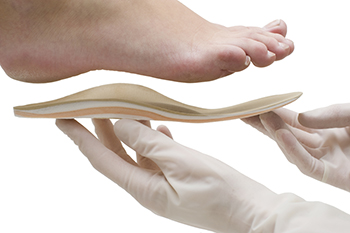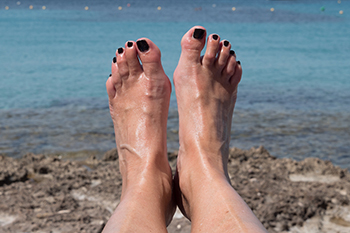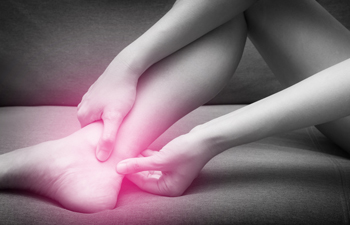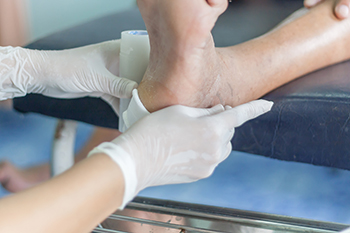March 2023
Choosing Custom or Over-The-Counter Orthotics

Many patients may be familiar with what orthotics are, but did you know there are different kinds? Essentially, orthotics are shoe inserts that can help relieve pain or correct deformities in the foot. There are two broad categories of orthotics. There are custom orthotics and over-the-counter orthotics. The former kind is custom-made by a podiatrist to fit your foot precisely, while the latter is not. Some patients are curious as to whether they should choose to wear custom or over-the-counter orthotics. There are several factors to consider when making this decision. For example, an individual might consider the fact that custom orthotics can generally be worn for longer periods because they have a long durable life. Also, custom-made orthotics can sometimes be more costly than over-the-counter orthotics because they are specifically designed for your foot. An individual might consider that over-the-counter orthotics are mostly widely accessible. If you are someone that is looking to choose a kind of orthotic, it is highly suggested that you contact a podiatrist for more information.
If you are having discomfort in your feet and would like to try orthotics, contact John Horlebein, DPM from Northern Cascades Foot & Ankle, LLC. Our doctor can provide the care you need to keep you pain-free and on your feet.
What Are Orthotics?
Orthotics are inserts you can place into your shoes to help with a variety of foot problems such as flat feet or foot pain. Orthotics provide relief and comfort for minor foot and heel pain but can’t correct serious biomechanical problems in your feet.
Over-the-Counter Inserts
Orthotics come in a wide variety of over-the-counter inserts that are used to treat foot pain, heel pain, and minor problems. For example, arch supports can be inserted into your shoes to help correct overarched or flat feet, while gel insoles are often used because they provide comfort and relief from foot and heel pain by alleviating pressure.
Prescription Orthotics
If over-the-counter inserts don’t work for you or if you have a more severe foot concern, it is possible to have your podiatrist prescribe custom orthotics. These high-quality inserts are designed to treat problems such as abnormal motion, plantar fasciitis, and severe forms of heel pain. They can even be used to help patients suffering from diabetes by treating foot ulcers and painful calluses and are usually molded to your feet individually, which allows them to provide full support and comfort.
If you are experiencing minor to severe foot or heel pain, it’s recommended to speak with your podiatrist about the possibilities of using orthotics. A podiatrist can determine which type of orthotic is right for you and allow you to take the first steps towards being pain-free.
If you have any questions please contact our office located in Chelan, WA . We offer the newest diagnostic and treatment technologies for all your foot and ankle needs.
Hyperhidrosis and Peeling

Are you someone that is noticing peeling of the skin on your feet? Skin peeling on the feet can be caused for many different reasons. However, one possible cause is actually a condition of the feet known as hyperhidrosis. Hyperhidrosis is characterized by excessive sweating of the feet, and the bottoms, or soles, of the feet, are commonly affected by this excessive sweating. In addition to peeling of the skin on the feet, you may also notice that hyperhidrosis is causing irritation and redness in the affected area. Hyperhidrosis can affect a very broad range of different individuals. If you are someone that struggles with either skin peeling or excessive sweating on the feet, then it is suggested that you schedule an appointment with a podiatrist or a foot specialist who can help you with treatment.
If you are suffering from hyperhidrosis contact John Horlebein, DPM of Northern Cascades Foot & Ankle, LLC. Our doctor can provide the care you need to attend to all of your foot and ankle needs.
Hyperhidrosis of the Feet
Hyperhidrosis is a rare disorder that can cause people to have excessive sweating of their feet. This can usually occur all on its own without rigorous activity involved. People who suffer from hyperhidrosis may also experience sweaty palms.
Although it is said that sweating is a healthy process meant to cool down the body temperature and to maintain a proper internal temperature, hyperhidrosis may prove to be a huge hindrance on a person’s everyday life.
Plantar hyperhidrosis is considered to be the main form of hyperhidrosis. Secondary hyperhidrosis can refer to sweating that occurs in areas other than the feet or hands and armpits. Often this may be a sign of it being related to another medical condition such as menopause, hyperthyroidism and even Parkinson’s disease.
In order to alleviate this condition, it is important to see your doctor so that they may prescribe the necessary medications so that you can begin to live a normal life again. If this is left untreated, it is said that it will persist throughout an individual’s life.
A last resort approach would be surgery, but it is best to speak with your doctor to find out what may be the best treatment for you.
If you have any questions please feel free to contact our office located in Chelan, WA . We offer the newest diagnostic and treatment technologies for all your foot and ankle needs.
Achilles Tendon Pain Often Requires Treatment

The Achilles tendon connects the muscles in the calf and lower leg to the heel bone. Like all tendons, this tendon is strong but not particularly flexible. If it is overstretched, it can become inflamed, which is tendonitis, or torn, and this is known as a rupture. When not taken care of, a condition called tendinosis can develop and chronic issues with the Achilles tendon will result. Achilles tendon injuries can cause mild to severe pain, burning, and stiffness in the Achilles tendon area or heel. These types of injuries are more common among athletes, especially runners, and those who play sports that require multiple starts, stops, and sudden changes of direction. Other groups of people who can be prone to getting Achilles tendon injuries are those who do not warm up prior to exercising, or those who increase the amount or intensity of their workouts suddenly. Additionally, patients who are obese, and those with prior health conditions, such as psoriasis or high blood pressure, may also be susceptible to incurring this type of injury. A rupture is a rare and serious Achilles tendon injury, and walking will usually be unbearable. If you have sustained an injury to your Achilles tendon, it is suggested that you see a podiatrist who can begin treatment as soon as possible, which may help to avoid further complications.
Achilles tendon injuries need immediate attention to avoid future complications. If you have any concerns, contact John Horlebein, DPM of Northern Cascades Foot & Ankle, LLC. Our doctor can provide the care you need to keep you pain-free and on your feet.
What Is the Achilles Tendon?
The Achilles tendon is a tendon that connects the lower leg muscles and calf to the heel of the foot. It is the strongest tendon in the human body and is essential for making movement possible. Because this tendon is such an integral part of the body, any injuries to it can create immense difficulties and should immediately be presented to a doctor.
What Are the Symptoms of an Achilles Tendon Injury?
There are various types of injuries that can affect the Achilles tendon. The two most common injuries are Achilles tendinitis and ruptures of the tendon.
Achilles Tendinitis Symptoms
- Inflammation
- Dull to severe pain
- Increased blood flow to the tendon
- Thickening of the tendon
Rupture Symptoms
- Extreme pain and swelling in the foot
- Total immobility
Treatment and Prevention
Achilles tendon injuries are diagnosed by a thorough physical evaluation, which can include an MRI. Treatment involves rest, physical therapy, and in some cases, surgery. However, various preventative measures can be taken to avoid these injuries, such as:
- Thorough stretching of the tendon before and after exercise
- Strengthening exercises like calf raises, squats, leg curls, leg extensions, leg raises, lunges, and leg presses
If you have any questions please feel free to contact our office located in Chelan, WA . We offer the newest diagnostic tools and technology to treat your foot and ankle needs.
Treatment of Foot Ulcers

A foot ulcer is any open sore on the foot. Such a sore may be on the surface of the skin or extend down to the tendons and bones. While commonly associated with diabetes, foot ulcers can arise from other various sources. Those with poor circulation, abnormalities in the bones or muscles of the feet, and skin cancer can develop foot ulcers that can become infected, are difficult to heal, and can have serious consequences for one’s health. An untreated infection can turn into an abscess or pocket of pus, cellulitis, a bone infection, or gangrene. It is suggested that you examine your feet daily and see a podiatrist as soon as possible if you notice an open sore on your foot.
Wound care is an important part in dealing with diabetes. If you have diabetes and a foot wound or would like more information about wound care for diabetics, consult with John Horlebein, DPM from Northern Cascades Foot & Ankle, LLC. Our doctor will assess your condition and provide you with quality foot and ankle treatment.
What Is Wound Care?
Wound care is the practice of taking proper care of a wound. This can range from the smallest to the largest of wounds. While everyone can benefit from proper wound care, it is much more important for diabetics. Diabetics often suffer from poor blood circulation which causes wounds to heal much slower than they would in a non-diabetic.
What Is the Importance of Wound Care?
While it may not seem apparent with small ulcers on the foot, for diabetics, any size ulcer can become infected. Diabetics often also suffer from neuropathy, or nerve loss. This means they might not even feel when they have an ulcer on their foot. If the wound becomes severely infected, amputation may be necessary. Therefore, it is of the upmost importance to properly care for any and all foot wounds.
How to Care for Wounds
The best way to care for foot wounds is to prevent them. For diabetics, this means daily inspections of the feet for any signs of abnormalities or ulcers. It is also recommended to see a podiatrist several times a year for a foot inspection. If you do have an ulcer, run the wound under water to clear dirt from the wound; then apply antibiotic ointment to the wound and cover with a bandage. Bandages should be changed daily and keeping pressure off the wound is smart. It is advised to see a podiatrist, who can keep an eye on it.
If you have any questions, please feel free to contact our office located in Chelan, WA . We offer the newest diagnostic and treatment technologies for all your foot care needs.







